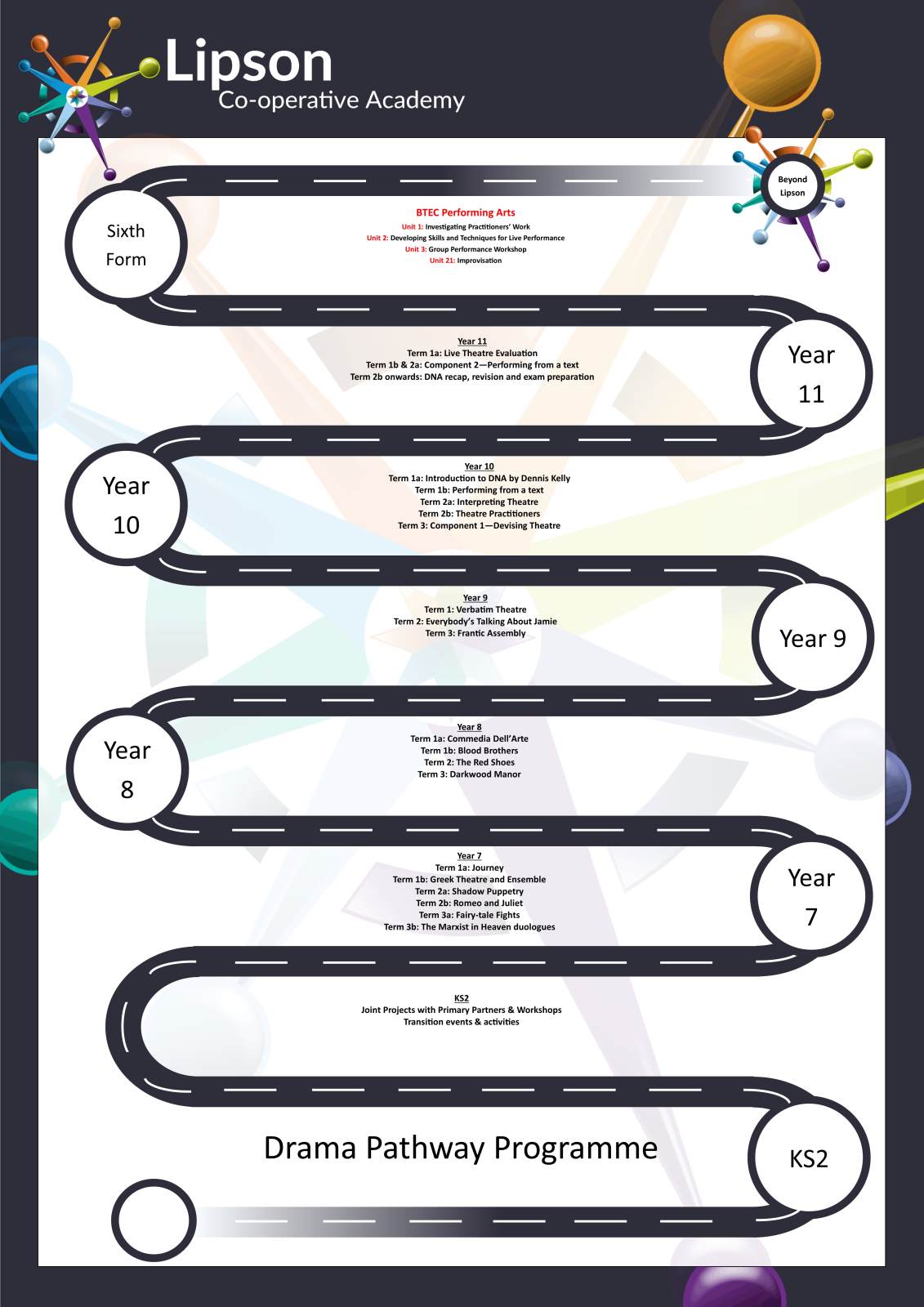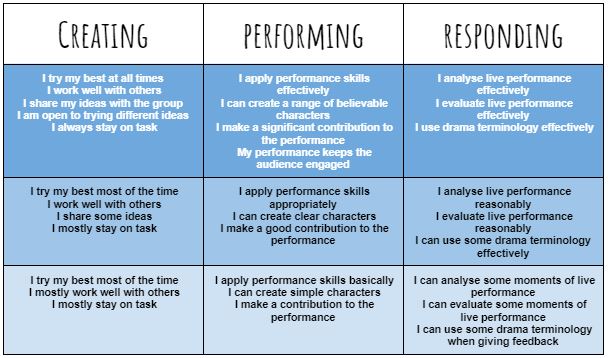Drama and Performing Arts

Drama is about live spectacle: bodies in a space encountering a shared experience. It allows us the opportunity to reflect on the world around us and consider our place within it. It allows us to look back into the past and peer into the future. Drama gives people a voice.
The study of Drama not only explores performance skills and practical work, but also historical, social, political and cultural context. Drama borrows theories from a vast range of subjects to help analyse and give meaning to work. It is a subject which encourages people to find answers within themselves and helps them develop as people. It is being able to watch students grow in confidence and stature which makes Drama a real privilege to teach.
The department hopes to deliver a curriculum which encourages students to be playful and take risks. I want to help them build their confidence, develop their skills in collaboration and communication and most importantly be creative.
The curriculum is designed to engage students in Drama from an early stage, whilst also providing a number of extra-curricular activities. As students’ progress through the curriculum they will develop a deeper understanding of Drama as a subject, alongside improving their performance skills.
Meet the Team
Brantley Rogers - Head of Drama & Performing Arts
Alicia Price – Teacher of Drama and Dance
Amanda Lockhart - Teacher of Drama and Art
Transition & building on KS2
We work with our Primary partners on a number of workshops and performances and through our Performance Academy we are able to work with students in Years 6-8 helping to nurture the actors, actresses & professionals of the future.
Our Curriculum
Through Drama, students learn a lot about themselves. They take on new challenges and are able to explore new ways of working. They develop both their confidence and communication skills which are vital for life beyond school. Drama also encourages students to look at the world from a different perspective, thus improving their ability to empathise with others.
Drama is a largely practical subject, however the study of Drama goes much deeper than simply performing. In KS3 the focus is on building confidence and developing practical skills. These are then applied, and developed further, throughout the KS4 curriculum. During KS4 students will also begin to explore different practitioners, as well as beginning to analyse theatre using a basic study of semiotics. These are then explored in even greater depth during KS5.
The main areas covered are:
- Developing a range of performance skills
- Applying knowledge and understanding when making, performing and responding to drama
- Exploring performance texts and understanding their social, cultural and historical context
- Being able to work collaboratively to generate, develop and communicate ideas
- Reflecting and evaluating on your own work and the work of others
- Understanding the roles and processes undertaken in contemporary professional theatre practice
Our curriculum is exciting, innovative and visionary.
Curriculum Overview (Click here)
Our Curriculum Learning Pathway

Drama Curriculum Pathway (PDF)
Our Exams
Our students are given the opportunity to study Eduqas GCSE Drama and the BTEC National Extended Certificate in Performing Arts at KS5
How do we measure attainment & progress?

In KS3 formative assessment plays a huge role. We will be observing student engagement throughout our sessions and students will be presented with a number of opportunities to present their work. Verbal feedback will also take on a prominent role, allowing our students to challenge themselves further.
In KS4 opportunities will be presented for students to participate in a number of mock exams, both practical and theoretical.
Our Assessment Objectives
At GCSE our assessment objectives are:
AO1 - Create and develop ideas to communicate meaning for theatrical performance
AO2 - Apply theatrical skills to realise artistic intentions in live performance
AO3 - Demonstrate knowledge and understanding of how drama and theatre is developed and performed
AO4 - Analyse and evaluate their own work and the work of others.
In KS5 all work is unit based and students will be working from assignment briefs. This means students should have a clear understanding of the assessment criteria. Students will be able to present their work at regular intervals to receive feedback on areas of development.
So why is drama important?
Drama provides students the opportunity to develop a diverse skill set which can be transferred to a range of settings. It is a subject which can aid personal growth and helps enhance our understanding of the world around us. But perhaps most importantly, it is fun!
How do we enrich our subject outside the classroom?
 Drama reaches beyond academic success and the impact of studying the subject can be felt differently by everyone. Drama encourages people to be playful, to be creative when faced with a problem. It requires people to collaborate and work effectively as a team, thus enhancing their social skills. It aids students to find new ways to articulate themselves and helps them find their voice. It teaches them about empathy and understanding. It gives students the opportunity to explore the world around them in a safe space, without fear of judgement.
Drama reaches beyond academic success and the impact of studying the subject can be felt differently by everyone. Drama encourages people to be playful, to be creative when faced with a problem. It requires people to collaborate and work effectively as a team, thus enhancing their social skills. It aids students to find new ways to articulate themselves and helps them find their voice. It teaches them about empathy and understanding. It gives students the opportunity to explore the world around them in a safe space, without fear of judgement.
There are a number of ways to get involved with Drama outside of the studio:
- Performing Arts Academy
- School productions
- Theatre trips
- Touring productions visiting our theatre
Useful websites
BBC Bitesize
http://www.bbc.co.uk/education/subjects/zbckjxs
Stiltskin
The Globe Theatre
http://www.shakespearesglobe.com/
Theatre Links
Royal Shakespeare Company
Frantic Assembly
http://www.franticassembly.co.uk/
Trestle Theatre Company

